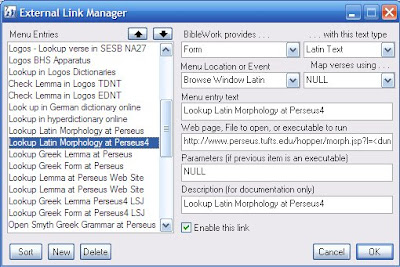BibleWorks recently announced:The Nova Vulgata is now available! The Nova Vulgata is the official Latin version of the Roman Catholic Church. The Roman Catholic Church has declared that the Nova Vulgata is "an auxilliary tool . . . to maintain the tradition of interpretation that is proper to the Latin Liturgy."
In their tradition of providing free new databases, this is a nice addition. There are some errors (follow the thread link above) in this first release that the incredible Pasquale has documented, primarily instances where spaces break up words. If you want to add a file manually to your BW database, he has provided an unofficial release that fixes the problems.
This is a free download for BibleWorks 7 users. To obtain the database, simply start BibleWorks and select
Help | BibleWorks on the Internet | Check for updates
Now, what are you going to do with this version, especially if you know little or no Latin? I will highlight some features in the screen capture below to indicates some of the possibilities.
Don't have BW7? This online site provides the Vulgate and Douay-Rheims in parallel. Also note that BW7 also includes a VUO version. This is basically the same as the VUL version except that in Psalms it uses Jerome's translation based on the Hebrew.
- Need more help with the Latin? Remember that with the ability in BW7 to create external links, you can look up a word in the Latin text at the online Perseus web site. As you can see in the screen capture, I have right clicked on "dives" and by clicking on "Lookup Latin Morphology at Perseus," it will open the dictionary entry for the word in my internet browser.
You probably already have the link to Perseus. If not, you can download Joe Fleener's shellexec.txt file here. There is an updated edition of Perseus known as Perseus4 that provides a lot more information, but sometimes the site is a bit flaky. The graphic below shows what you should enter in the External Link Manager. In the executable line, enter: http://www.perseus.tufts.edu/hopper/morph.jsp?l=&la=la

- Also check this BW Forum thread that provides to download the Lewis Latin Dictionary and link a version of it into BW7.
- Next, note in my first screen capture that some of the words in the VUL and NOV are highlighted in yellow. These two Latin versions provide a good opportunity to use the "Text Comparison Settings" in BW7. Click on the icon near the top left of the buttonbar (circled on the graphic; otherwise use Tools > Text Comparison Settings), and the dialogue box opens. You will see where I have used one of the lines to compare the VUL and NOV and then checked "Enable" to highlight the differences in yellow. In the case of Luke 16.22 which I am using, we can see that different words for "poor" are used: mendicus / pauper. You can always turn off the highlighting by unchecking "Enable" and applying it.
- With this highlighting, we can also see that the VUL adds a clause at the end (in inferno) which shows up as an additional phrase in the DRA ("in hell") that does not appear in other English translations. This should alert you to the probability of a text critical issue. In this case, the phrase εν τω αδῃ does appear in the original Sinaiticus, but it was corrected and does not show up in other Greek mss.
- Okay, big finish! What was the name of the rich man in this parable about the poor man who is explicitly identified as Lazarus? The rich man is never named, but traditionally he has been known as Dives... which is simply the Latin word for "rich."
- The translators of the King James Version worked with the Greek and Hebrew and were consciously distinguishing their English translation from the Latin Vulgate, but the Vulgate doubtless influenced some of the English renderings. We see the influence of the Latin/English overlap in matters like the name of Dives. Another notable example is "Calvary" in Matthew 27.33 // Luke 23.33. "Calvary" is simply the Latin word for "skull." (You won't find "Calvary" in just about any of the modern English translations.)
- The Latin can often alert us to text critical issues in the Greek texts.








Mark, very helpful instructions and I will certainly put this to use. I did not know the influence which the Vulgate had on the KJV translators.
ReplyDeleteDirk M.
BW6 & BW7